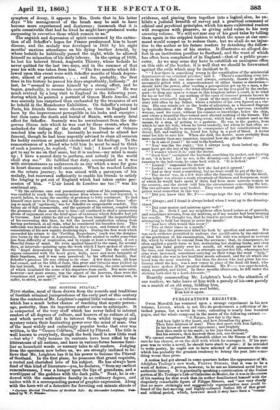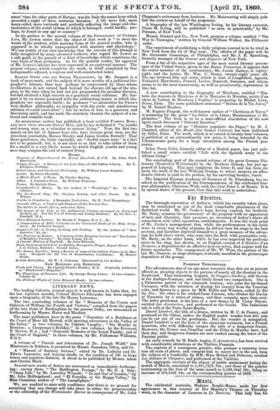PUBLICATIONS RECEIVED.
Owen Meredith has ventured upon a strange experiment in his new volume, Lucite, which is not like its predecessors a collection of de- tached poems, but a novel in verse, extending to nearly four hundred pages, and the whole composed in the metre of the following extract :-
"0 0 Nature, how fair is thy face,
And how light is thy heart, and how friendless thy grace ! Thou false mistress of man! Thou dost sport with him lightly, In his hours of ease and enjoyment ; and brightly Dalt thou smile to his smile; to his joys thou inclinest, But his sorrows, thou knowest them not, nor divineat."
We cannot compliment Mr. Meredith either on the fitness of the mea- sure he has chosen, or on the skill with which he manages it. If his pur- pose was to write a novel, he should have stuck to prose ; if he intended to write poetry, he ought not to have selected of all measures the one which has probably the greatest tendency to betray the poet into some- thing worse than prose.
A notion had got abroad in some quarters before the appearance of Mr. Adolphus Trollope's new work, FTLEPPO STEOzzt, that it was to be a work of fiction ; it proves, however, to be not an historical novel but an authentic history. It is practically speaking a continuation of the Italian portion of M r. Trollope's Life of Catherine de Medici, far it was in the mange of his reading for that work that its author familiarized himself with the singularly remarkable figure of Filippo Strozzi, and "saw very dearly that no more strikingly and suggestively representative man could be found of the fast-moving and highly-coloured Italian life at that great and critical period, which, however much it may have been a rums-
sauce' time for other parts of Europe, was for Italy the sunset hour which preceded a night of three centuries duration. A life more full, more many-sided, more variously and perfectly reflecting the image and cha- racteristics of the social system to which it belonged, could hardly, per- haps, be found in any age or country." In the preface to the second volume of the Pirrsrowoit or COMMON LIFE, Mr. Lewes states that the object of that work is "to meet the wants et the student, while meeting those of the general reader, who is supposed to be wholly unacquainted with anatomy and physiology." We can testify of our own knowledge that the success of this attempt is fully recognized by many advanced students, who regard Mr. Lewes as a safe guide in the pursuit of a kind of knowledge which constitutes the very basis of their profession. As for the general reader, his approval of Mr. Lewes's labours has been expressed in no equivocal manner. The present volume, which completes the work, is itself completed by that indispensable adjunct, a copious and well-constructed index.
ROBERT OWEN AND HIS SOCIAL PHILOSOPHY, by Mr. Sargant, is book of more mark, and the subject of it more worthy of a judicious bio- grapher's labours, than may perhaps be conjectured by those whose recollections do not extend back beyond the obscure old age of the uto- pian, to the time when he had not yet propounded his peculiar theories, but had attained a high renown as a practical social reformer. Mr. Sar- gant is by no means possessed with the sublimating mania to which bio- graphers are especially liable ; he professes "no admiration for Owen's very shallow philosophy, no sympathy with his crude and mischievous schemes of social innovation" ; but he writes of him in a generous mid discerning spirit, and has made the crotchety theorist the subject of a ra- tional and readable book.
• An anonymous author has published a book entitled FAMOUS Boys; AND HOW THEY BECAME GREAT MEN, and he has dedicated it "to youths and young men, as a stimulus to earnest living." Now, the first two names on his list of famous boys who have become great men, are the American journalists, Horace Greeley and James Gordon Bennett! That these gentlemen, the latter especially, are " drefful smart men," is a fact not to be gainsaid; but it is not clear to us that to take either of them for a model is a very likely means by which English youths and young men may compass the end of earnest living.
Boma.
Memoirs of Major-General Sir Henry Havelock, K.C.B. By John Clark
Marshman
Filippo Stro=i. A History of the Last Days of Old Italian Liberty. By T.
Adolphus Trollope.
Robert Owen, and his Social Philosophy. By William Lucas Sargent.
Lucile. By Owen Meredith.
A Man's Heart. A Poem. By Charles Mackay.
Alban. A Narrative Poem. By William Thurston.
Poems. By Quintin Bone.
Grandmother's Money. By the Author of " Woodleigh," Sze. In three
volumes.
The Ice-Bound Ship, The Sleeping Beauty, and other Poems. By M.
Winter.
Goethe in Strasbourg. A Dramatic Noxivelette. By H. Noel Humphreys.
Corvoda Abbey ; or Lights and Shadows of the Present Day.
The Settler in South Afri 7a, and other Tales.
The Gospel of St. Luke in the Authorized Version, arranged in Parts and Sections, 4-c. For the Use of Schools and Young Students. By the Rev. J.
Forshall, M.A.
Three Hundred Sonnets. By Martin F. Tupper, D.C.L., fee.
A Compendium of Bible Criticism on the Canonical Books of the Holy Scrip-
tures. By Frederick Sargent.
Steyne's Grief; or Losing, Seeking, and Finding. By the Author of "Bow Garrett.," Ike, Sze.
The Prorince of Reason. A Criticism of the Bampton Lecture on" The Limits
of Religions Thought." By John Young, LL.D.
A Concise History of England. By John Edwards.
Plain Sermons preached at Archbishop Tennyson's Chapel, Regent Street. By
J. C. Cowan, Minister. Second Series.
The Roman Republic; being a Review of some of the Salient Points in its His-
tory. Designed for the Use of Examination Candidates. By Horace Moule.
British Butterflies. By W. S. Coleman. Illustrated by the Author.
NEW EDITIONS AND REPRINTS.
Fleets and Navies. By Captain Charles Hamley, R.N. Originally published in "Blackwood's Magazine."
the Physiology of Common Life. By George Henry Lewes. In two volumes. Volume II.
The Poetical Works of John Edmund Reade. In two volumes.



























 Previous page
Previous page